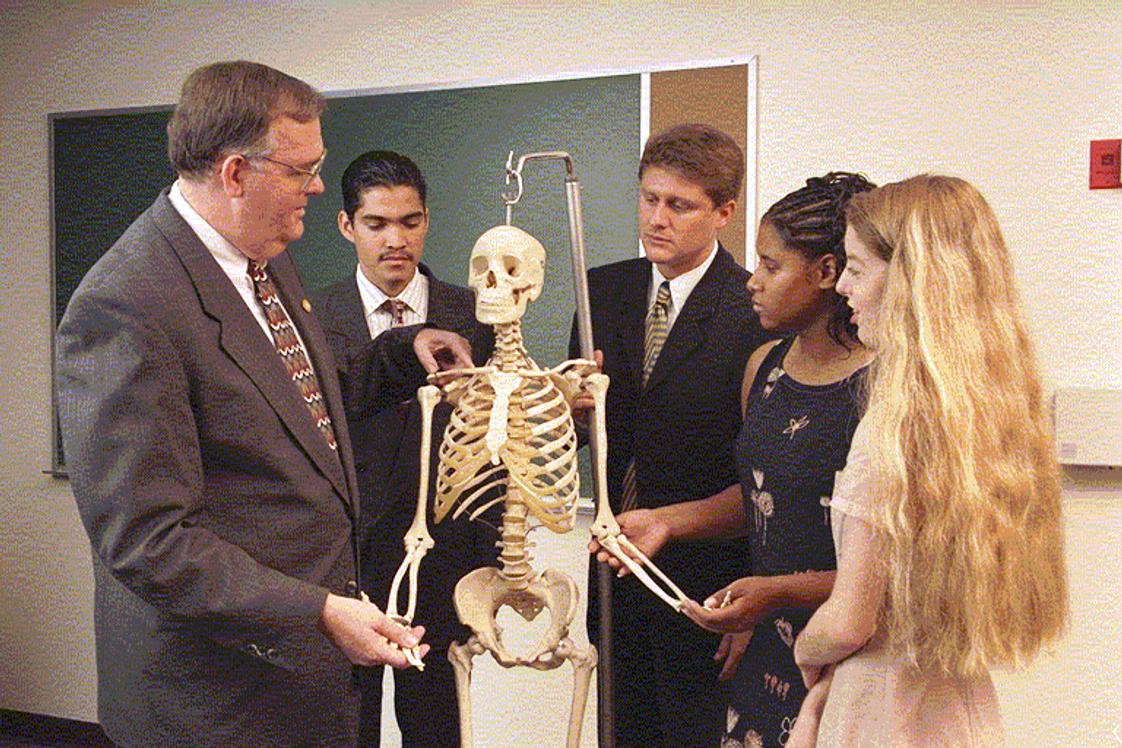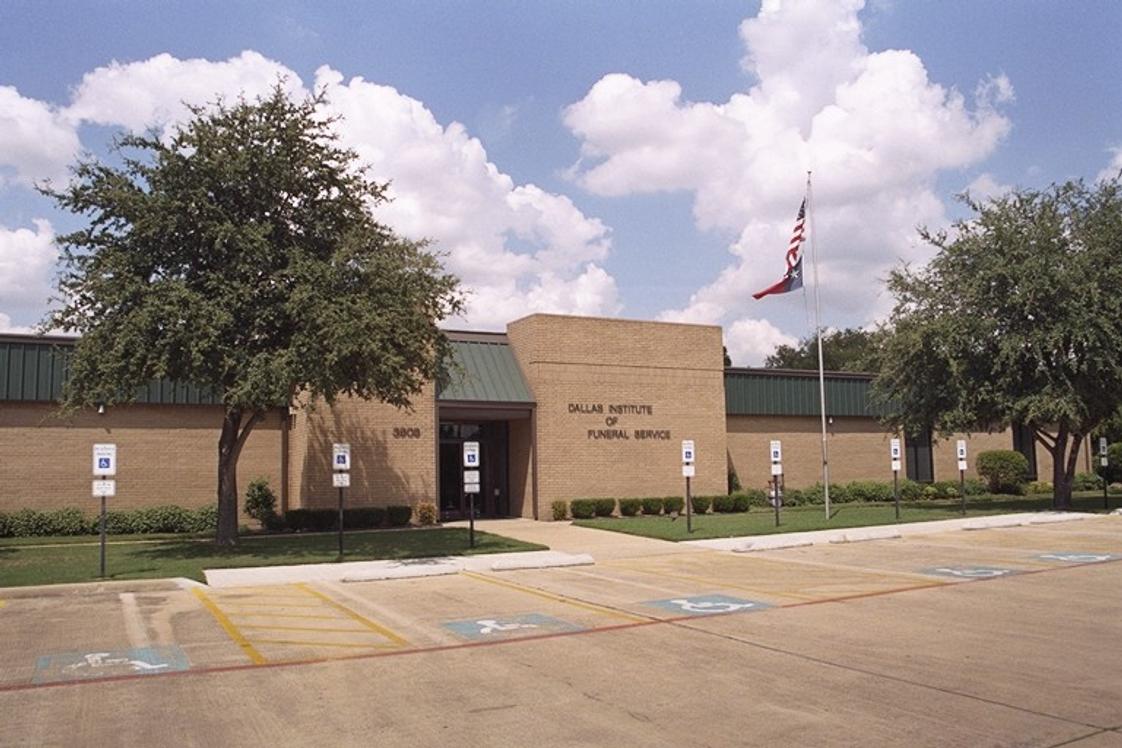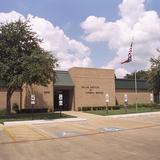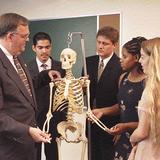- Dallas Institute of Funeral Service offers educational opportunities to those interested in funeral service as a career.
School Highlights
Dallas Institute of Funeral Service serves 959 students (66% of students are full-time).
The college's student-teacher ratio of 32:1 is higher than the state community college average of 23:1.
Minority enrollment is 43% of the student body (majority Black and Hispanic), which is less than the state average of 74%.
Quick Facts (2026)
- Enrollment: 959 students
- Private-state tuition: $14,800
- Acceptance Rate: 82%
- Student-teacher ratio: 32:1
- Minority enrollment: 43%
- Source: Verified school update
Top Rankings
Dallas Institute of Funeral Service ranks among the top 20% of public schools in Texas for:
Category
Attribute
Completion Rates
School Overview
The teacher population of 30 teachers has stayed relatively flat over five years.
Dallas Institute of Funeral Service
(TX) Community College Avg.
Carnegie Classification
Special Focus Two-Year: Arts & Design
Baccalaureate/Associate's Colleges: Associate's Dominant
Institution Level
At least 2 but less than 4 years
At least 2 but less than 4 years
Institution Control
Private not-for-profit
Public
Total Faculty
30 staff
262 staff
Number of Programs Offered
2
8
Student Body
The student population of Dallas Institute of Funeral Service has grown by 77% over five years.
The student-teacher ratio of 32:1 has increased from 21:1 over five years.
The Dallas Institute of Funeral Service diversity score of 0.61 is less than the state average of 0.70. The school's diversity has declined by 7% over five years.
Total Enrollment
959 students
4,931 students
Student-Teacher Ratio
32:1
23:1
# Full-Time Students
630 students
909 students
# Part-Time Students
329 students
4,022 students
# Enrollment Undergraduate
959 students
403 students
# Full-Time Undergraduate Students
630 students
890 students
# Full-Time Graduate Students
n/a
40 students
# Part-Time Undergraduate Students
329 students
4,166 students
# Part-Time Graduate Students
n/a
47 students
Total Dormitory Capacity
n/a
252 students
% American Indian/Alaskan
2%
n/a
% Asian
1%
6%
% Hispanic
16%
46%
% Black
19%
13%
% White
57%
26%
% Hawaiian
n/a
n/a
% Two or more races
4%
3%
% Non Resident races
n/a
2%
% Unknown races
n/a
4%
Diversity Score
0.61
0.70
College Completion Rate (Students who graduate in less than 4 years)
75%
55%
College Completion Rate (Students who graduate in 4 years or more than 4 years)
n/a
34%
Average Graduate Earnings (10 Years)
$38,200
$34,600
Tuition and Acceptance Rate
The private state tuition of $14,800 is more than the state average of $14,275. The private state tuition has grown by 15% over four years.
Private State Tuition Fees
$14,800
$14,275
Tuition Notes
$ 3990/qtr on campus
$4500/qtr online
% Students Receiving Some Financial Aid
91%
84%
Median Debt for Graduates
$12,272
$10,765
Median Debt for Dropouts
$4,682
$5,500
Acceptance Rate
82%
82%
Source: 2024 (or latest year available) Integrated Postsecondary Education Data System (IPEDS) , School Administrators
School Notes
- Dallas Institute of Funeral Service is a non-profit institution dedicated to education and research for the funeral profession. Dallas Institute of Funeral Service offers educational opportunities to those interested in funeral service as a career. The institute provides the theory portion and practical application of funeral service education preparing the student for entry into the profession and for a State and/or National Board examination enabling him/her to begin or continue apprenticeship or internship for licensure. Dr. Carl Barnes, a well-known medical expert, founded this school in 1900 and called it Barnes School of Anatomy, Sanitary Science and Embalming. Professor Hood F. Smith directed the school, under the supervision of Dr. Barnes, until 1908 and then assumed full charge. He was assisted by Professor Will Dwyer. At that time, the name was changed to the Dallas School of Embalming. In 1969, Dallas Institute was invited to establish a similar satellite branch in Atlanta, Georgia. Because there were so many graduates of the Gupton-Jones College when it was in Nashville, the Board of Trustees decided to restore this well-known name to its new branch in Atlanta. The Dallas Institute then resumed its former name, Dallas Institute of Mortuary Science, which was later changed to Dallas Institute of Funeral Service. The Dallas Institute of Funeral Services is accredited by the American Board of Funeral Services Education (A.B.F.S.E.). The A.B.F.S.E. in an agency recognized by the United State Office of Education.
Frequently Asked Questions
How much does Dallas Institute of Funeral Service cost?
Dallas Institute of Funeral Service's private state tuition is approximately $14,800.
What is the acceptance rate of Dallas Institute of Funeral Service?
The acceptance rate of Dallas Institute of Funeral Service is 82%, which is equal to the state average of 82%.
What is Dallas Institute of Funeral Service's ranking?
Dallas Institute of Funeral Service ranks among the top 20% of community college in Texas for: Highest completion rates.
Recent Articles

Community College vs. Bootcamps for Tech Careers in 2026
Community college vs. bootcamps in 2026. Compare cost, outcomes, credentials, and hiring trends to choose the best tech career path.

How to Build a Class Schedule That Fits Your Life (Spring 2026)
Learn how to build a class schedule that fits your life with expert tips, updated strategies for Spring 2026, and practical planning tools for students and families.

Top 10 Jobs for Community College Graduates in 2026
Meta Description: Discover high-demand jobs for community college graduates, with current salary trends, costs, and career pathways.




















